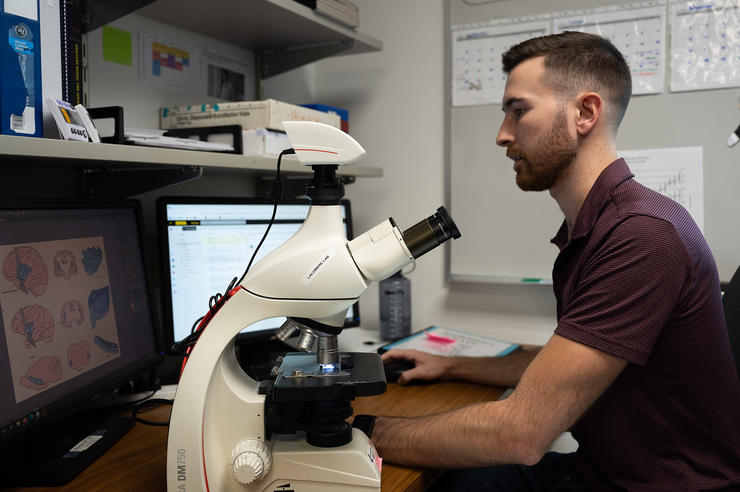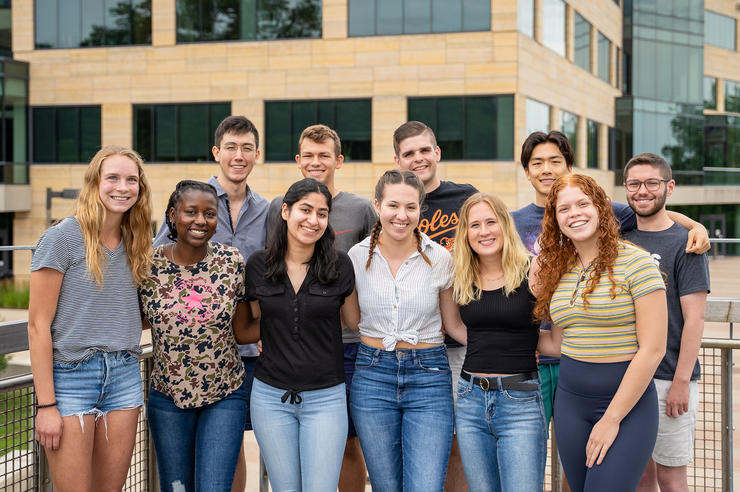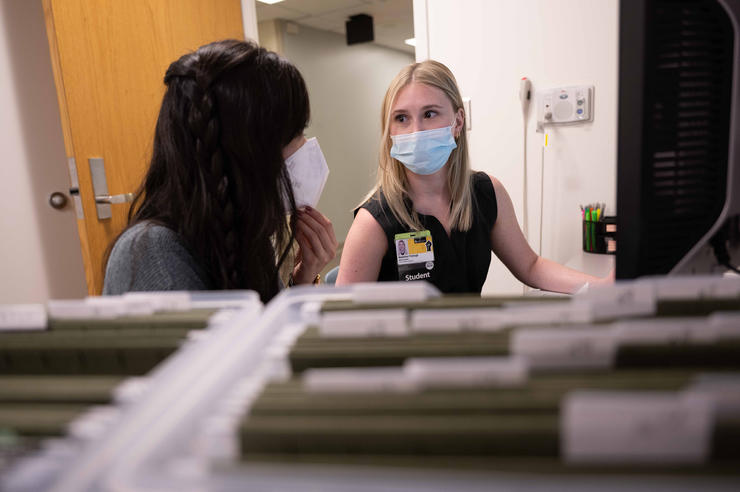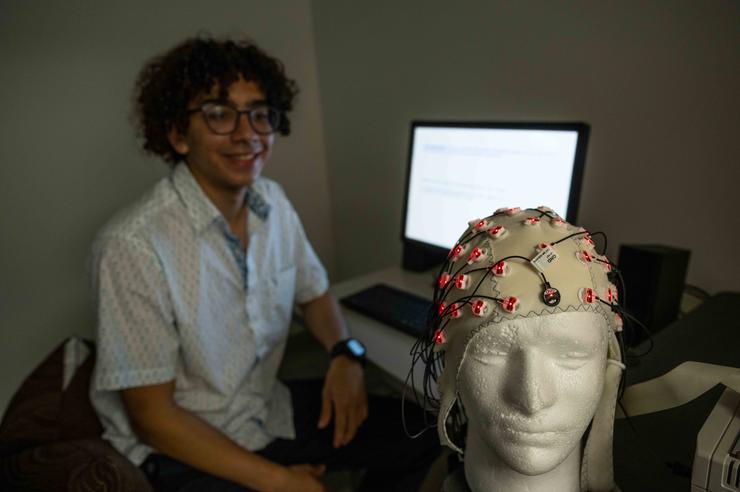Student podcast shines spotlight on public health
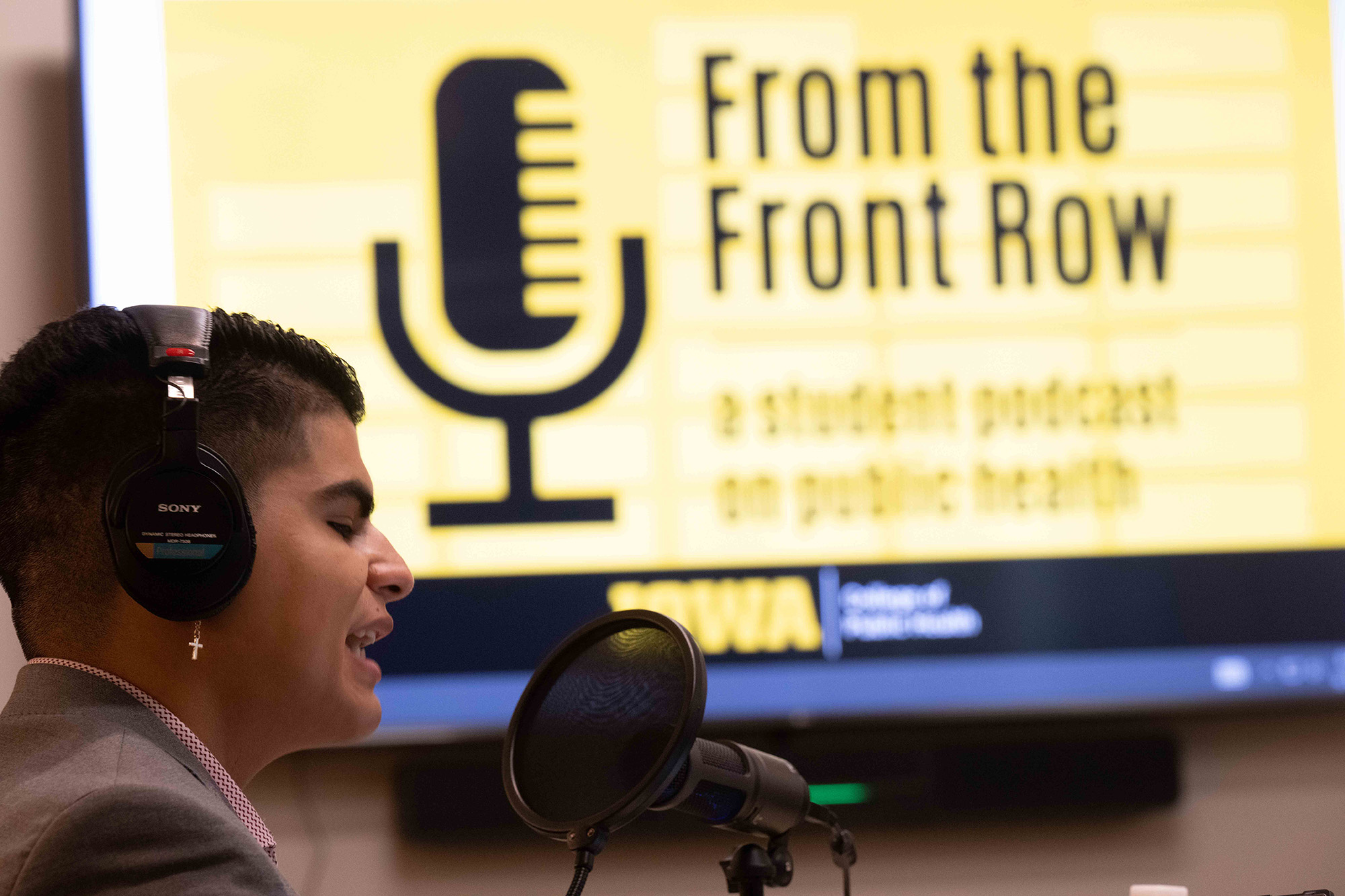
University of Iowa College of Public Health student Eric Ramos records an episode of From the Front Row. The award-winning, student-run podcast features weekly discussions with public health experts on topics relevant to everyone. Photo by Tim Schoon.
While Stevland Sonnier was considering graduate schools for public health, a couple of colleagues suggested he look at the University of Iowa. While researching the UI College of Public Health, he discovered the student-produced From the Front Row podcast.
“I listened to a few of the episodes, and one was with Mona Hanna-Attisha, a pediatrician who was really at the heart of exposing the Flint, Michigan, water crisis,” Sonnier says. “I thought, ‘Wow, they are talking to one of the key practitioners of the key public health principles at the issue of this crisis. This is a very important conversation that this person gets to have and learn from as a student.’ I wanted to be a part of that.”
Sonnier joined the podcast team shortly after starting at Iowa and became the executive producer his second year. He received an MPH with an emphasis in policy in 2021 and now works as a federal policy analyst at MITRE, where he says he uses many of the skills that he gained while working on From the Front Row.
“I advise the federal government on health care solutions, and a big part of that is engaging with community members, talking with them, listening to what their needs are, and then translating them into effective recommendations,” Sonnier says. “Working on the podcast really helped me figure out what effective public health messaging looks like. Science changes, it’s very complicated, etc., but how do you quickly, concisely, and clearly communicate a message to folks from different backgrounds with different viewpoints? That was a critical element that we engaged with in every podcast.”
This award-winning, student-run podcast out of the UI College of Public Health features weekly discussions with public health experts on topics relevant to everyone. The current podcasters include Anya Morozov, Radha Velamuri, Eric Ramos, Logan Schmidt, and Ben Sindt.
If you have a suggestion for a future podcast topic, email cph-gradambassador@uiowa.edu.
The podcast began in 2018, and there have been new episodes every week since, covering topics ranging from the connection between food production and rural and immigrant health, dealing with the opioid epidemic, delivering mental health and counseling services on a college campus, newborn screening programs, intimate partner violence, and, of course, navigating COVID-19.
“The podcast has been an impressive student-run initiative from the beginning,” says Lexie Just, associate director of admissions and recruitment in the College of Public Health. “Ian Buchta was the first producer and he set the tone on day one. Ian turned the reins over to Steve Sonnier, then Alexis Clark, and now to our current producer, Anya Morozov. They’ve led podcast teams that have put out engaging and informative public health content every week. I just can’t say enough about what everyone associated with the podcast has brought to the podcast and to our college.”
Morozov, From the Front Row’s current executive producer, also discovered the podcast while trying to decide on graduate schools. And while the school’s strong sense of community is what ultimately swayed her, the podcast didn’t hurt.
“I thought it must be a pretty cool school of public health if they were able to keep a podcast going for so long,” says the second-year student in the Department of Epidemiology, who grew up in Fremont, Nebraska.
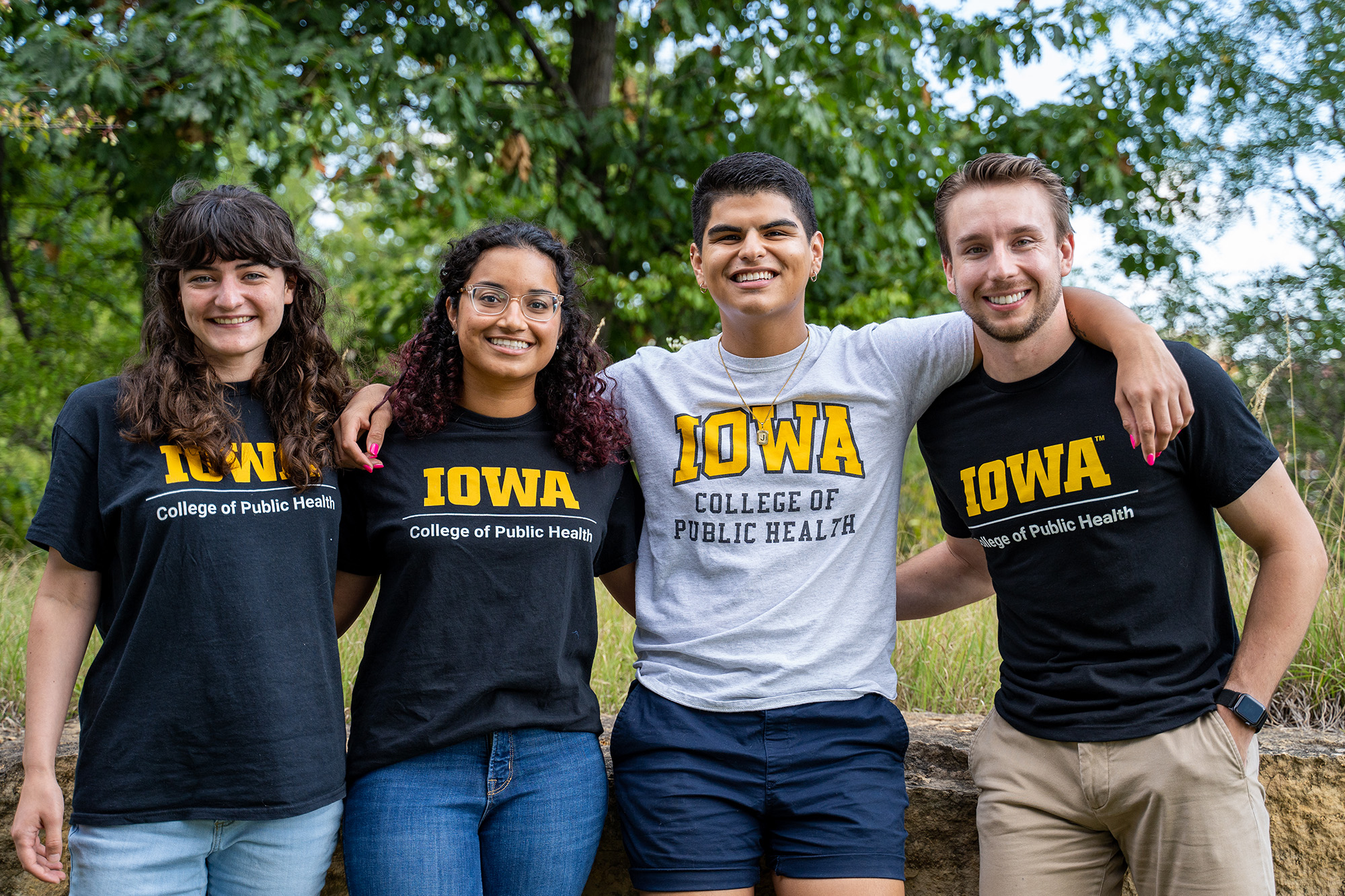
“Whether you’re the public relations officer who’s actually communicating about the topic, or you’re working in a clinic, or you’re doing boots-on-the-ground public health work, being able to communicate your work and its value is really important. This podcast gives people a unique opportunity to do practice that.”
Morozov and Sonnier say how podcast topics and guests are chosen varies.
“There’s that Calvin and Hobbes comic about ‘write what you know,’” Sonnier says. “So, I would interview people I had met through my work or find people who could talk about things I was interested in. But I was just one voice, and the rest of the staff had insight into areas aside from my focus of health policy. They were able to bring other guests to the table and shine a spotlight on those areas.”
Listeners to the podcast also weigh in about what they want to hear.
“That’s what led to a recent podcast about the University of Iowa Free Mobile Clinic and an upcoming series about climate change,” Morozov says. “So, it’s just a wide blend of things with the overall goal of making public health topics accessible and highlighting work that’s going on at the College of Public Health and across Iowa.”
Anya Morozov, current executive producer:
One episode that’s been one of my favorites is the one with Corey Dion Lewis, a health coach and host of the Healthy Project podcast. It was just a cold email I sent out after reading about his work online, and I was surprised he even responded! It ended up being a great conversation about health coaching and community, and he talked about an upcoming conference that he was organizing in Des Moines and Iowa City to get community voices and health professionals together. But really, every episode has taught me something new—especially the question we ask at the end of every episode: “What was one thing you thought you knew, but were later wrong about?”
Stevland Sonnier, former executive producer:
The first one that comes to mind is one we did with the HIV Alliance in Eugene, Oregon, where I worked while I was a student at the University of Oregon. I think it was just one way I tried to pay it forward for the opportunity to work with them. Talking with them about their experiences, the importance of what they do, and the contributions that they’ve made in their local community, felt like a bowl of chicken soup. It just felt great to have that conversation with those folks again. It felt like being home.
While the podcast aims to introduce public health topics to the general public, there is another important audience: students and potential students.
It serves as an introduction to the UI College of Public Health—as Sonnier and Morozov know firsthand—but also to the field of public health.
“Why is this an interesting field to get into? Why should you look at this versus any other number of careers?” Sonnier says. “Or, how does it relate to other careers? Other fields are very influenced by public health, so getting exposure to that was a critical driving force for me when we were considering what the vision was for the podcast structure.”
From the Front Row introduces students to more than the technical aspects of producing a podcast—although they get a crash course in that, too.
“Working on the podcast has created many opportunities for students to engage with both local and national public health experts and has allowed them an opportunity to gain invaluable skills, including leadership, interviewing, and networking,” Just says. “Our podcast producers set up an effective model of onboarding new podcasters by having them conduct an interview with a seasoned podcaster prior to tackling an interview on their own. It’s been a great strategy, one that they will also be able to utilize in their future careers. Being involved with a podcast and highlighting the skill set gained will allow these students to stand out in the job-seeking process.”
Morozov says she’s interested in going into public health at a local, state, or federal governmental level, and, as in any public health field, excellent communication skills are important.
“Whether you’re the public relations officer who’s actually communicating about the topic, or you’re working in a clinic, or you’re doing boots-on-the-ground public health work, being able to communicate your work and its value is really important,” Morozov says. “This podcast gives people a unique opportunity to practice that.”
Sonnier says to be a good communicator, you first have to be a good listener.
“Listening and processing in the moment, especially when the interview is complicated or very difficult, is critical,” Sonnier says. “We’ve had conversations with folks about uncomfortable topics, such as reproductive justice, with many views and many sides to the conversation. It taught me a lot more about the weight of your words. I think a lot of folks speed through things, so they talk very fast—and I’m one of those people in a social setting. But working on the podcast really was an experience in learning to slow down. That was really impactful and definitely has translated into my current work.”
“Networking is great, but you also get to know thought leaders in your field. They help shape your perspective of who you want to be and where you want to be as a professional in the public health field. The podcast broadened my horizons as to what public health means and what public health can do.”
Interested in creating a healthier world? The University of Iowa College of Public Health prepares its students to do just that. Help people live healthier, longer, and more productive lives. Focus on prevention instead of treating the symptoms of disease. Improve health for entire populations through research, education, and policy. The college offers undergraduate and graduate programs of study in several disciplines.
Listening back to recorded podcasts—while uncomfortable at times—also provides students a good learning opportunity.
“Hearing how you communicate has been really valuable,” Morozov says. “It’s not very fun at first, but you learn a lot about what you say and how you respond and how to be a more active listener.”
Sonnier reminds students that their years as a student go by quickly, and the podcast offers a great way to make the most of it.
“Meeting people is essential for many different reasons,” Sonnier says. “Networking is great, but you also get to know thought leaders in your field. They help shape your perspective of who you want to be and where you want to be as a professional in the public health field. The podcast broadened my horizons as to what public health means and what public health can do.”
Morozov agrees.
“The podcast has given me a chance to expand my education, and hopefully the education of the other hosts, beyond what we talk about in class,” Morozov says.
As Morozov prepares for her spring 2023 graduation, she is also looking toward handing off From the Front Row to the next generation of podcasters.
“An important thank-you goes to the previous hosts and executive producers who have kept the podcast going for years now,” Morozov says. “With hopefully many more years to come!”
